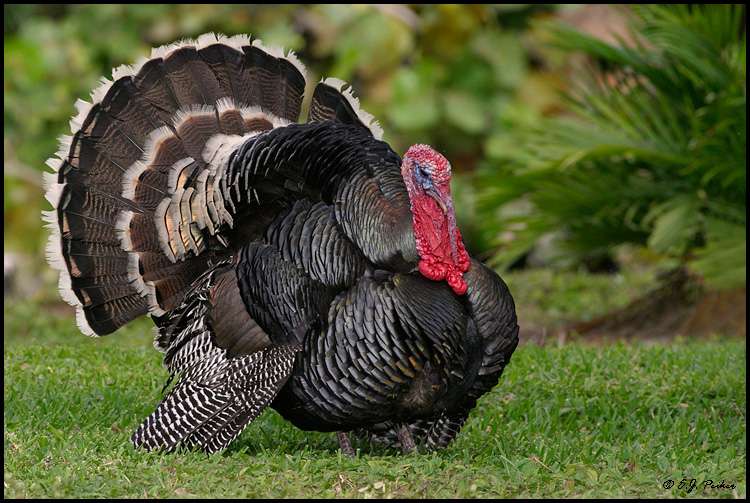Flannery O'conner's story "The Turkey" focuses on an eleven-year-old boy named Ruller who chases down a wounded turkey. O'connor provides glimpses into Ruller's imagination throughout the story and this is what makes the story interesting. Ruller is an unusual boy who spends a lot of time by himself. I can relate to Ruller's tendency to imagine as a way to make life more compelling. While Ruller's father thinks that playing alone is unusual behavior for a young boy, one can argue that this is perfectly normal for a child with an overactive imagination.
The story also focuses on Ruller's concept of God. Ruller attributes the cause of events in his life to decisions that God makes. Ruller believes that God gives him the turkey so he can bring it home and impress his family. Language regarding God's influence on Ruller's life is a big part of the story's humor. O'connor seems to be commenting on the tendency of humans to believe that God personally controls the outcomes of everyday life.
Ruller's main shortcoming is his belief that God is responsible for how his life works. This allows Ruller to avoid responsibility for his own actions. Ruller has bizarre sense of right and wrong. After he captures the turkey and wins the admiration of people in his town, he feels a need to give money to a beggar. Giving money to the poor is Ruller's way of thanking God for the turkey. Unfortunately, in the same way that Ruller tracks down the turkey, a gang of boys trakc down Ruller and steal his turkey. After this happens, it's natural to assume how Ruller feels about this. It's a tragic end for Ruller that points out the flaw in believing that God is personally invested in trivial human events. The story is an interesting exploration of childhood imagination and a brilliant snapshot of a single meaningful event in the life of a young boy.
The story also focuses on Ruller's concept of God. Ruller attributes the cause of events in his life to decisions that God makes. Ruller believes that God gives him the turkey so he can bring it home and impress his family. Language regarding God's influence on Ruller's life is a big part of the story's humor. O'connor seems to be commenting on the tendency of humans to believe that God personally controls the outcomes of everyday life.
Ruller's main shortcoming is his belief that God is responsible for how his life works. This allows Ruller to avoid responsibility for his own actions. Ruller has bizarre sense of right and wrong. After he captures the turkey and wins the admiration of people in his town, he feels a need to give money to a beggar. Giving money to the poor is Ruller's way of thanking God for the turkey. Unfortunately, in the same way that Ruller tracks down the turkey, a gang of boys trakc down Ruller and steal his turkey. After this happens, it's natural to assume how Ruller feels about this. It's a tragic end for Ruller that points out the flaw in believing that God is personally invested in trivial human events. The story is an interesting exploration of childhood imagination and a brilliant snapshot of a single meaningful event in the life of a young boy.
Buy Here:

Actually God is invested in all events from the grand to the seemingly trivial. His Word says so. So it is not a flaw to think that way per se but O Connor nails the fact that even persons of faith often base their idea of God's eternal love for them on temporal blessings which come and go like the turkey in the story.
ReplyDeleteThank you for saying this! it made me very sad that the person who wrote this post would think that belief in God's investment is a shortcoming, and that ruller's giving the beggar a dime is somehow an example of his bizarre sense of right and wrong. God shows Himself in so many different ways, and yes even in the small trivial moments. it's a shortcoming to believe that God doesn't care and that people of faith think they have no agency whatsoever.
Deleteand the story is about ruller's encounter with God, and how it changes him. at first, he says he would chase the turkey down across county lines if he had to so he would get the validation he feels he needs from his family. Why would a boy that determined to catch a turkey all day long not try and chase it down after the boys steal it and are merely a block away? wouldn't he, out of anger and frustration, chase down the boys to retrieve what was rightfully his? but he doesn't, because after 1) his personal encounter with God and 2) his gift of charity and thanksgiving he no longer needs to feel like this turkey and the dime and even his own family's approval is necessary for his happiness, because he found a deeper happiness from the things that are eternal.
Thank you AB for spreading the truth of God's Word to the masses and dispelling ignorance of God.
(sorry i got kinda longwinded; this post made me sad and honestly kinda hurt)